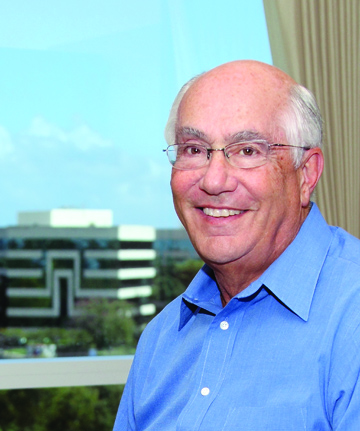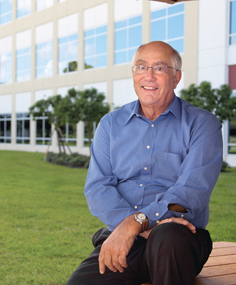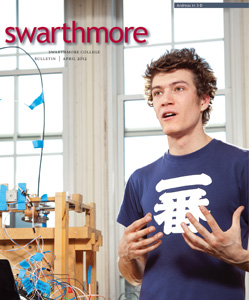From Business to the Board Room
Former Board of Managers’ Chair Neil Austrian ’61 reflects on college, career, and consensus
At 71, Neil Austrian ’61 is vital as ever—gregarious, engaging, and happy to be working. He’s made several attempts to retire during the past decade, all of them futile. Austrian’s long and varied business career has taken many turns, but like a successful tight end, he’s stayed on his feet while managing companies such as advertising agency Doyle Dane Bernbach; private equity firm Dillon Read; cable TV’s Showtime/The Movie Channel; the National Football League; and a variety of entrepreneurial ventures. In October 2010, Austrian was asked to return to Office Depot for a second stint as its CEO, where he has made a three-year commitment. He has served on the Office Depot board since 1998 and ran the company on an interim basis for six months in 2004. He and his wife, Nancy, live in Delray Beach, Fla., a few miles from Office Depot’s headquarters.
Austrian credits his liberal arts degree and engineering major for his agility—and his success—in so many different industries. And an important part of that liberal education, Austrian will tell you, was athletics.
Austrian’s relationship with Swarthmore began in fall 1957 as a freshman from Pelham, N.Y., and ended with his resignation from the Board of Managers after 21 years on the Board, eight of them as its chairman.
Jeffrey Lott sat down with Austrian last fall at the Office Depot headquarters in Boca Raton. Their wide-ranging conversation covered a lot of ground—from the way he manages a global corporation—Office Depot had $11.6 billion in sales in 2010—to the early deaths of his parents and the mentors who helped take their place, to how he views Swarthmore today.
For Austrian, the quality of personal relationships seems to matter more than bottom lines and split decisions; and it’s through these relationships that he has been successful in business; nurtured a family; and maintained a wide circle of friends, many of whom were his teammates or fraternity brothers at Swarthmore.
You said in a recent interview that your liberal arts education at Swarthmore was the best thing that ever happened to you. Could you elaborate?
Pelham, N.Y., was pretty homogeneous in the 1950s. People at Swarthmore had a broader range of interests—and allowed their interests to change—so the person you became at Swarthmore was very different than the person you were when you came in. For me, in engineering classes, there was a right answer: Two plus two is four. But in the humanities or social sciences, you might get an argument about that. In terms of thinking outside the box and preparing myself to tackle problems that I hadn’t seen before, that was good experience for me.
At Swarthmore, it was almost required to have intellectual curiosity.
Yeah, I think it was. But you have to look back to the time. And you know, in the ’50s and early ’60s, what probably changed the country was Vietnam, to a great extent. But Vietnam really wasn’t an issue when I was in college. Most of the social issues that were taking place at Swarthmore, where they had petitions to sign every night while you waited in Parrish to get in to eat, concerned far-off places that most of us had never heard of. But a half-dozen people felt the need. The only issue that I could really get involved with at that time was Chester, because it was right there, so you were aware of what was going on in Chester. My brother was registering [black] voters during the summer in Georgia. There was a social influence in our house.
College was not just about academics, obviously.
Swarthmore changed my life in terms of being exposed to people who thought very differently from me, who grew up in different circumstances, who just looked at things very differently. And it was also the first time I was around people who expressed their social conscience. But I would not have survived at Swarthmore were it not for athletics.
Why is that?
Academics were very time-intensive. We had 8 o’clock classes in engineering. Invariably, I had a lab from 1 to 4 or later. The athletics that started at 4:30 or 5 gave me an outlet. After dinner, I’d be up until 1 or 1:30 studying, just to get the next day’s work done. Athletics gave me a chance, I think, to do something else, to be with a group of people who had the same sense of why sports were important at a school like Swarthmore. It was important for one reason: It was fun. We’d all grown up playing sports. We were all competitive. It was a chance to test ourselves in a different way.
Were most of your college friends on the football team?
They were. And we were all in the same fraternity, DU, but we represented a lot of different academic interests.
Why did so many of you go into business?
I think maybe athletics had something to do with it. Business is competitive. There are very few people who want to be in business to not succeed or grow. And I think when you play a sport—any sport—you’d like to win. You’re going to be a good sport, but you’re not playing just to provide an opponent for the other team.
How did you get into business after Swarthmore?
I graduated as an engineer—although I knew after my freshman year that I didn’t really want to be an engineer. But [Professor of Engineering] Sam Carpenter convinced me that the thinking and technical discipline of engineering, coupled with a liberal arts background at Swarthmore, would be extraordinarily useful because I wanted to go into business. Bill Robinson [’60], one of my best friends at Swarthmore, who had been an honors history major, had landed a job with IBM in sales and said to me, “Hey, if a history major can do this, an engineering guy ought to be able to.” And Moon Mullins [Edgar Mullins Jr., then assistant professor of mathematics]—who was the academic adviser to the football team and also was a technical adviser to IBM—paved the way for me to get an interview.
I worked in the Chester office. In those days at IBM, for the first year or so you were sent to school for six or eight weeks at a time, then back to the field office, then back to school. That’s where I met Nancy; she was teaching for IBM in Philadelphia. She’d graduated from Penn, an economics major, and was in the first or second class that admitted women to the Wharton School. Although she didn’t teach my class, we met in September [1961] and got married the following September.
That October, the Cuban missile crisis came up—and we still had a draft. So rather than risk the vagaries of the draft, I applied to the Naval Officer Candidate School in Newport and was commissioned as an ensign, then assigned to a ship in Iwakuni, Japan, 20 miles from Hiroshima. When Nancy and I got there, we asked to live out and learn Japanese. We had three great years there—and Nancy’s still fluent in Japanese.
After the Navy, you went to Harvard Business School.
I knew I wanted to go to graduate school when we got back. I got out of the Navy in January 1966 and went back to IBM in Philadelphia before going to Harvard in the fall—with Nancy and our first child, Neil Jr., who had been born in Japan. IBM gave Nancy a job in their Boston office. We had our second son [J.J.] during my second year at Harvard.
 After receiving an M.B.A. from Harvard Business School in 1968, Austrian joined the investment-banking firm, Laird, Inc., which was pioneering private equity investing. In 1970, he and four partners started the private equity firm Dryden & Co. In 1973, Austrian joined advertising giant Doyle Dane Bernbach as its chief financial officer, becoming its chief executive in 1975. He ran Showtime/The Movie Channel—a joint venture of Warner Communications and Viacom—from 1984–1986, then returned to private equity management at Dillon Reed. The National Football League hired him as its president and COO in 1991. He retired from the NFL in December 1999.
After receiving an M.B.A. from Harvard Business School in 1968, Austrian joined the investment-banking firm, Laird, Inc., which was pioneering private equity investing. In 1970, he and four partners started the private equity firm Dryden & Co. In 1973, Austrian joined advertising giant Doyle Dane Bernbach as its chief financial officer, becoming its chief executive in 1975. He ran Showtime/The Movie Channel—a joint venture of Warner Communications and Viacom—from 1984–1986, then returned to private equity management at Dillon Reed. The National Football League hired him as its president and COO in 1991. He retired from the NFL in December 1999.
So it’s been a great career. I’ve had fun jobs all along the way. People always ask me, what’s your favorite job, and it’s hard, because they were all fun jobs at that point in my life, and I never look back. You look ahead. And I’ve just been very fortunate. I mean, Nancy and I have been married for 49 years. We have six kids—three of whom are adopted. Life’s been pretty good.
Working at the NFL, where the major business happens on Sundays, did you have to be away from your family on weekends?
For most of my life, I have refused to work on weekends—even at the NFL. The weekend is family time. Paul Tagliabue [then commissioner of the NFL] and I had an agreement that somebody had to stay home and look at the games on television. So I didn’t go to a game every weekend—and if I did go, more often than not I took Nancy and whichever kids were still around.
Your father died while you were quite young.
He did. And my mom died a couple years before him—the summer between my sophomore and junior year. And my dad died September 1962. He was in New York Hospital and couldn’t even attend our wedding. So Nancy—this tells you something about Nancy—got the whole bridal party together. We drove up to New York after the reception and were remarried in the hospital chapel so that my father could see us get married. He died the day we got back from our honeymoon.
What impact has that had on you, losing your parents at that age?
A lot of things happened all at the same time. Losing my mom was very hard, especially on my father, because she was his nurse. He was a dentist, and they were together 24 hours a day. I think that my getting married and going off to Japan at age 22 made me fiercely independent very quickly. And I grew up maybe a lot faster than I might have. We were on our own. In a lot of ways, it made our marriage much stronger. I regret that my parents didn’t get to know Nancy; my mother never met her. My father had met Nancy but only several times before he died. He never met our kids. So that part’s kind of a missing piece of life.
What’s been the biggest source of satisfaction in your professional life?
At the end of the day, accomplishing what you set out to accomplish but doing it having fun at the same time. Being successful while also being considered a nice person. I don’t ascribe to the idea that nice guys finish last. I think if you can be 100 percent honest with the people with whom you work—and they know that when you say something, you believe it, that you’re going to stand by it, you get the trust of the people that you work with. At the end of the day, the CEO basically leads by example, sets the course, and it’s the rest of the people that really have to execute. What’s your biggest source of frustration? Details. At some point, you have to get involved, but to me, the daily grind of details gets frustrating. Also, in [Office Depot], part of the frustration was the many levels of bureaucracy that we’ve had to break down to empower the right people to make their own decisions, as opposed to thinking that the next level up is going to make that decision for them.
Office Depot was hit hard by the recession, losing nearly $1.5 billion in 2008. What do you see as your role here now?
What I’m doing is a turnaround at this point—basically trying to focus the company on a set of very specific initiatives in the short term to get us back to the profitability we once enjoyed. I’m having fun in that leadership role, and I believe I’m making a difference. Now we’re seeing some of the differences, and I think that’s the best part—when what you do can affect 42,000 employees.
It’s a leadership position. You’re not going to do anything yourself. You’ve got to do everything through the people that work with you. For me, the biggest job is to set the agenda and strategy and make sure everybody’s on the same page.
In the late 1990s, you grappled with the role of athletics as a member of the Board of Managers. The College made a big effort to turn its football program around but ended up dropping the sport after the 2000 season. What was your role in this?
You know, it’s extraordinarily difficult for me, because the decision and the way it happened was both institutional and personal. After that Board meeting that Saturday [when the decision was made to drop the football and wrestling programs], and after I went and talked to [head football coach] Pete Alvanos, I think sides got chosen right after that. And I think some Board members thought I was disloyal in writing a letter to alumni. I don’t think that the alumni at large really understood the process. In fact, I know they didn’t. I don’t think they understood that there was absolutely no consensus, and no consensus on the Athletic Review Committee two weeks before the recommendation got made.
If there were one thing that you could say to set the record straight about what happened that year, what would it be?
When we have difficult decisions that are going to affect a large number of people, much greater care needs to be taken to give time and weight to a minority viewpoint. Because, at the end of the day, it may not be the minority.
Those of us who didn’t want to see this happen viewed it as an important decision. You can’t get consensus on every issue—nor should you even try, whether you’re running a business or a college. But there are certain things about which you should make a greater effort, when you know what their relative importance is, and how many different parts of the community will be affected.
What led you to re-engage with the College by reaching out to President Chopp—offering to host a reception and cocktail party in New York this past year?
Tom Spock [’78 and a member of the Board of Managers] and I worked together for years at the NFL [where Spock was the chief financial officer], and he knew how deeply hurt I was. He set up a dinner in New York with Rebecca and myself. And we talked for a couple hours. I thought that if I could get her in front of those who were disaffected, that it might be step one in terms of healing all the wounds. I’ll do anything I can to help her be successful.
You were invited to come to the DU pig roast last fall. Were you just unable to come?
Right. I would have loved to do it. I just didn’t have the time. Maybe next year.
 Email This Page
Email This Page
